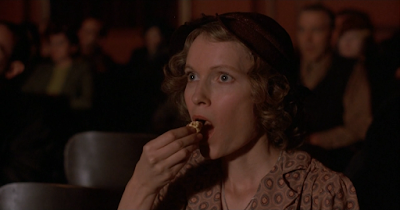This is my entry in the Classic Movie Blog Association's A Haunting Blogathon: In the Afterlife. For more eerily delicious articles, please visit here.
 |
| Bud and Lou on opposite sides of the revolution in 1946's "The Time of Their Lives." |
My Father: How many times can you watch the same film?
9 year old me: a lot.
If you grew up in the New York metropolitan area in the 1960s - 1980s, you probably remember Million Dollar Movie. Twice nightly for an entire week channel 9 would run the same movie. The opening theme was especially memorable. Upon seeing "Gone With the Wind" for the first time in its theatrical release in 1967, my friends and I (and probably a bunch of others in the theatre) exclaimed "that's the theme from Million Dollar Movie!" when we first heard Tara's Theme.
Bud and Lou were already well known in my house via reruns of their television show (an afternoon ritual). Seeing them in a story, and such a funny and rather scary story, only made me love them more.
 |
| Ghosts Lou Costello and Marjorie Reynolds realize they are ghosts condemned as traitors |
"The Time of Their Lives" is an un unusual Abbot and Costello film because Bud and Lou are not a team here. In fact, Bud is the target of Lou's antics. Briefly, Lou plays a Revolutionary War era tinker named Horatio Prim. Horatio was a patriot who wanted to earn enough money to buy his servant girl sweetheart out of her indentured servitude. In the meantime, a plot with Benedict Arnold was afoot. In a case of mistaken identity (what else?) he and patriot lady Melody Allen (Marjorie Reynolds) are taken for traitors, shot, their bodies thrown to the bottom of the well and bound by a spell that condemns them on the Danbury property unless they are proven not to be traitors. Of course, the real traitors were butler Cuthbert (Abbott) and Melody's fiancé, Tom Danbury. A letter from General Washington could clear the doomed duo and one did exist, but it was hidden by the duplicitous Tom.
Fast forward to modern times and the old Danbury estate has new tenants. Horatio and Melody have been rambling around the property for centuries, but this new crew moving in consists of a Cuthbert look-alike (Abbott again as Cuthbert relation Dr. Greenway) and a few other non-believers. The ghosts are able to communicate their plight via psychic housekeeper Emily (Gale Sondergaard), Washington's letter is found thanks to a message sent by the repentant Tom, the cursed duo are united in Heaven with their loved ones and Cuthbert/Greenway finally gets punished.
What charmed me as a kid were the special effects. The ghosts have some fun with cars and radios and the fact that they can walk through walls. When Melody spots the beautiful fashions of the day and dresses up in a modern evening gown and jewels, only the clothing and jewelry are visible to mortal eyes, setting the stage for only a pair of stockings running up the stairs past a terrified Binnie Barnes.
A special shout out to Gale Sondergaard as Emily. She is Judith Anderson's equal when it comes to creepy housekeepers (making Binnie Barnes's line "didn't I see you in Rebecca?" even more amusing) and I can still hear her spooky way of calling to Melody as the long-dead Tom Danbury during a séance (Mel-o-deee.....Mel-o-deee).
 |
| "Didn't I see you in Rebecca?" |
 |
| Those ghosts are real! |
















